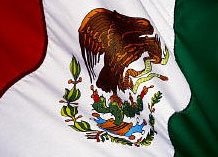
PREFACE: This is the first in a series of profiles we will have on potential U.S. presidential candidates for 2008.
From the glorious days of the American Revolution to the terrible years of the Civil War, and through modern times, Virginia has been a key player in U.S. history and politics for over 400 years. Today, Virginia just might provide the Democratic and Republican parties with their next
presidential candidates and the U.S. with its next president.
Virginia's Republican Senator George Allen and its former Democratic Governor Mark Warner are being heavily courted by their political parties and may well end up fighting it out with other contenders for their parties' nominations. At any rate, it's a safe bet that we will be seeing many more appearances by both men in the nation's television news shows, and in the nation's newspapers as the country gears up for the 2008 presidential race.
So far this year, Allen has visited Iowa, New Hampshire, Texas, South Carolina, and North Carolina in March and April, all key primary states. Through his many appearances, he has been able to capture the attention of many Republicans, who are talking about him as a potential presidential or vice-presidential nominee.
He is the son of the famous Washington Redskin's football coach, George H. Allen, and is regarded as an unpretentious "average Joe" who proudly shows off his Southern heritage by knocking about in his cowboy boots.
The seemingly easygoing Allen has an impressive political resume in his native Virginia where he first served in the state's House of Delegates from 1983 to 1991. That same year, Allen won a special election, which allowed him to represent Virginia's seventh district in the U.S. House of Representatives. After one term, he ran for governor and was elected as Virginia's 67th Governor in 1993. He then ran for the senate and defeated incumbent Democratic Virginia Senator Chuck Robb in 2000.
Allen says his personal role model is Ronald Reagan and just like the late president, he is a splendid orator with an amiable and politically astute approach to his profession. In fact, when he began his active involvement in politics in 1976 he was named state Chairman of Young Virginians for Reagan.
Conservatives in his state adore him. As governor, he took on the state bureaucracy. Even before taking office, he asked 400 public employees for their resignations. As governor, he eliminated parole for violent criminals and drastically reformed the state welfare program. He managed to push through a highly successful legislative agenda even though Republicans were the minority party in the State General Assembly.
There's no mistaking Allen's deep rooted conservatism. As Governor, Allen attracted businesses to Virginia by offering millions of dollars in tax incentives. As Senator, he voted for Bush's tax cuts. And although he has refused to say whether he is pro-life or pro-choice, or whether Roe v. Wade should be overturned, he is rated 100% by National Right to Life. He also supports a marriage amendment in Virginia and has stated his disregard for activist judges in the federal bench. But even many moderates love him because he has an unpredictable libertarian streak.
Mark Warner was born into a family of modest means. He was the first one to attend college, earning a law degree at Harvard. He was one of the co-founders of the telecommunications company Nextel and made a fortune estimated at $200 million before entering politics. In 2001, he was elected governor of Virginia by five points, he left in January 2006 with an approval rating of 75%. In 2005 Time magazine ranked Mark Warner as one of the top 5 governors of the United States.
Many Democrats are hoping Warner will be the party's next Bill Clinton -- a presidential candidate with Southern charm and a mix of conservative views on issues like budgets, bureaucracies and a liberal approach to civil rights, labor issues and education that will appeal equally to NASCAR dads and soccer moms.
Even though, Virginia has not voted for a Democrat since 1964, many on the Democratic side are hoping the state could be the starting point to recapture the South. The 11 states of the South plus Oklahoma, Kentucky and West Virginia, have 173 electoral votes between them, and for years now has been solidly Republican. If Democrats don’t manage to loosen the stranglehold Republicans' have on the south, they have to win at least 74% of the electoral votes in all other states to win the Presidency. Bill Clinton, a former Arkansas governor, was the last to pull it off in 1996 when he won West Virginia by a razor thin margin. Clinton also won Tennessee, Kentucky, Florida, and Arkansas. Sen. John Kerry lost all of the southern state as well as the national election in 2004.
Many feel Mark Warner is the man to begin a era in the South for the Democratic faithful because of his recent achievements as governor of Virginia. He worked with Republican officials and the business community to reform the tax code, which resulted in a great decrease in food and income taxes and pushed through a school reform bill, which many believe improved the quality of high school education.
Warner’s much vaunted economic programs are credited with helping Virginia achieve a growth rate of 5.9 %, outpacing the national average of 4.8 %. During his tenure, Mr. Warner says he made "more cuts in state government than anyone in Virginian history."
Zell Miller, a former conservative Democratic Senator from Georgia who is notorious among Democrats for breaking ranks and speaking at the 2004 Republican National Convention in support of President George W. Bush for President, listed Mr. Warner as someone who would be an ideal candidate for President. When Warner served as chairman of the National Governors Association from 2004-2005, it gave him an opportunity to travel the country and expand his political contacts. He visited Iowa, a must for presidential contenders, and established a Political Action Committee or PAC. The PAC has raised $8.2 million dollars since Election Day 2005 according to published reports.
No matter where you stand on the political spectrum, this election will be exciting to watch, in particular if the candidates are as talented and closely matched as Senator Allen and Governor Warner. Maybe they can compromise; one can be President and the other Vice-President?
Carlos de Cordoba, Page One Media staff
Daniel Garza, President of Hispanic and PODER group
 Blog
Blog




